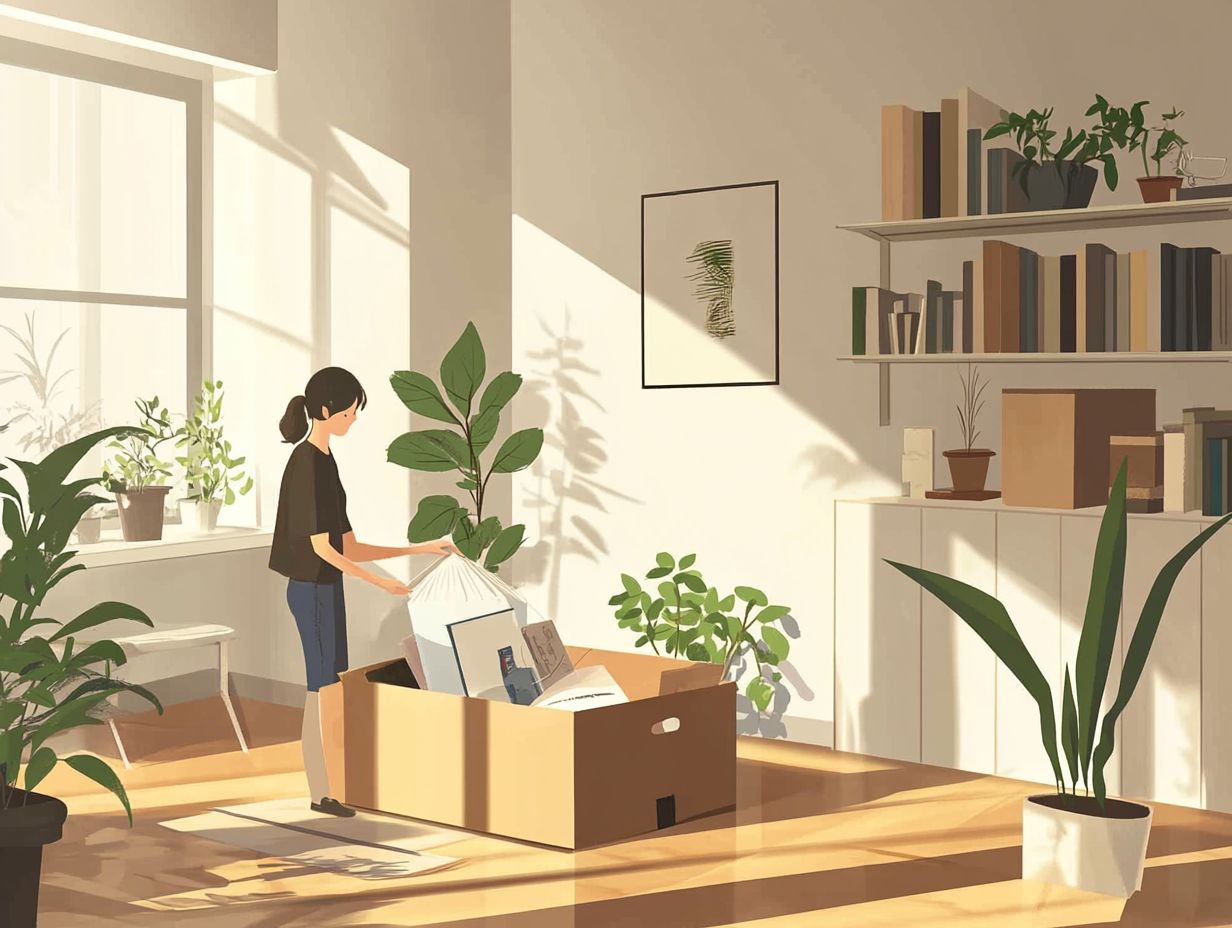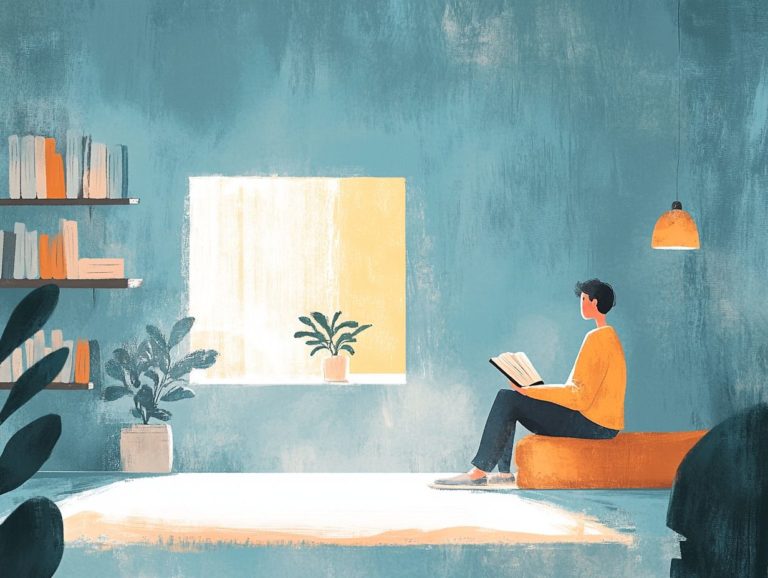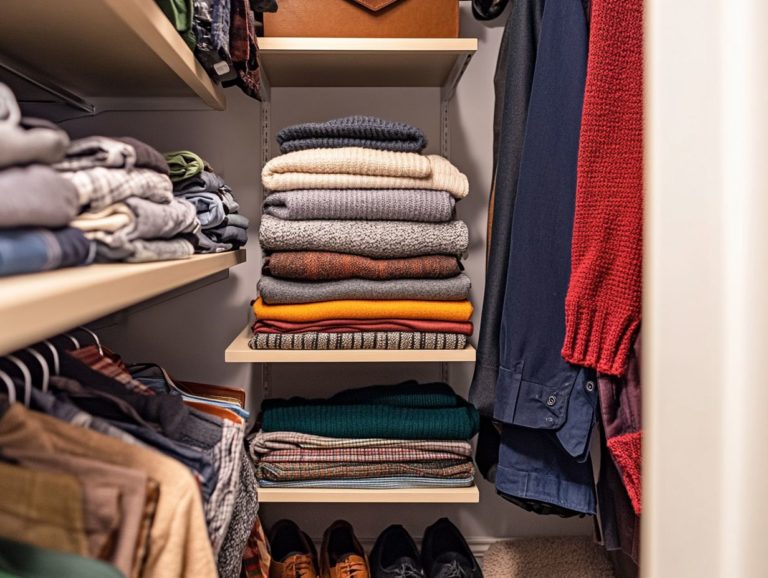How to Make Decluttering a Habit
In today s fast-paced world, it s all too easy for clutter to pile up, affecting both your mental clarity and physical well-being.
This article delves into the importance of decluttering, showcasing its myriad benefits while offering practical strategies to establish a routine that suits your lifestyle. You ll explore popular methods, such as Marie Kondo’s KonMari approach a popular decluttering method that encourages keeping only items that spark joy alongside minimalist practices. You ll also find tips to help you maintain an organized space.
We ll tackle common hurdles, from emotional attachments to navigating shared spaces. Let’s start this exciting journey together to transform your environment and mindset!
Contents
- Key Takeaways:
- Why Decluttering Matters for Your Life
- Creating a Decluttering Routine
- Methods for Decluttering
- Tips for Maintaining a Decluttered Space
- Organizational Strategies
- Preventing Clutter from Accumulating
- Overcoming Common Obstacles
- Frequently Asked Questions
- What is the best way to start decluttering on a regular basis?
- How can I stay motivated to declutter regularly?
- What should I do with items I no longer want or need?
- How can I prevent clutter from building up again after decluttering?
- What are some easy decluttering habits to incorporate into my daily routine?
- How can I get my family or roommates on board with decluttering regularly?
Key Takeaways:

- Decluttering benefits your mental and physical health, making it essential to embrace these habits in daily life.
- Establishing a decluttering routine through scheduling and goal-setting makes the process more manageable.
- Using methods like the KonMari Method and minimalist practices helps maintain an organized space.
Why Decluttering Matters for Your Life
Decluttering goes beyond simply organizing your home; it embodies a profound lifestyle shift that can elevate both your mental and physical well-being by fostering a serene, uncluttered space. Understanding the benefits of decluttering includes lower stress levels and enhanced productivity. It is also necessary to manage clutter to prevent future build-up.
By developing good cleaning habits and focusing on keeping only what you need, you can unlock the transformative potential of a clutter-free environment ultimately leading to a deeper sense of peace and well-being. This journey reinforces the benefits of decluttering.
Benefits for Mental and Physical Health
The benefits of decluttering go far beyond aesthetics; they truly enhance both your mental and physical health by fostering a clutter-free environment that promotes clarity and focus.
Research shows that people who keep their spaces tidy report 30% lower levels of stress and anxiety compared to those living amidst clutter. This reduction in anxiety not only bolsters emotional well-being but also boosts your productivity, enabling sharper focus on the tasks at hand.
A well-organized environment also improves air quality by reducing dust and allergens, which is essential for your respiratory health. Plus, the act of decluttering encourages physical activity as you move things around, ultimately enhancing your mobility.
Engaging in this process refreshes your living or working space and acts as a powerful wellness strategy that encourages letting go of things that no longer serve you.
Creating a Decluttering Routine
Creating a decluttering routine is crucial for maintaining a clutter-free home and developing lasting habits that seamlessly integrate into your daily life. This approach enables you to sustain a serene living environment over time.
By establishing a clear schedule and setting realistic goals, you can kickstart a home reset that revitalizes not just your space but your mindset as well. Incorporating a robust organizing system into your daily habits will aid in managing clutter while inspiring you to adopt a minimalist mindset.
This shift prioritizes simplicity and intentionality in both your living and shopping practices, enhancing your overall quality of life.
Don t wait begin your decluttering journey now for a clearer mind and a happier home!
Establishing a Schedule and Setting Goals
Establishing a decluttering schedule and setting specific goals is essential for successful decluttering. This approach transforms the process from overwhelming to manageable, enabling you to seamlessly integrate decluttering into your daily habits.
By breaking down tasks into smaller, easily achievable steps, create a personalized strategy that fits perfectly into your unique lifestyle. For example, choose specific rooms or categories to focus on each week. This helps maintain momentum, and celebrating those small victories along the way keeps your motivation high.
Utilizing tools such as checklists or mobile apps assists you in tracking your progress. They serve as reminders to stay focused on the ultimate goal of a more organized space. Incorporate regular check-in milestones to ensure your decluttering journey stays on track and provides a sense of accomplishment, highlighting the importance of consistency in your simplification efforts. For more tips, check out this guide on how to stay motivated while decluttering.
Methods for Decluttering

Explore a wealth of amazing methods for decluttering, each presenting its own unique approach to achieving that coveted simplified, clutter-free space.
Consider popular techniques such as Marie Kondo’s KonMari Method, which focuses on keeping items that spark joy, along with various minimalism practices that inspire significant lifestyle transformations.
Marie Kondo’s KonMari Method
Marie Kondo’s KonMari Method invites you to embrace the joy of decluttering by thoughtfully evaluating your personal possessions. This transforms the way you approach organization and aids in the extreme decluttering process.
This method encourages you to embark on a transformative journey, assessing each item based on whether it sparks joy in your life. By focusing on categories rather than rooms, you can more easily recognize the items that genuinely hold value for you.
Incorporating the ‘joy check‘ into your daily routine allows you to cultivate a more mindful relationship with your belongings. This fosters an emotional connection that guides you in making conscious choices about what to keep and what to release. To make the process even more enjoyable, you can explore how to turn decluttering into a fun activity, aligning with your decluttering questions.
This holistic approach not only clears your physical space but also opens the door to mental clarity and emotional resilience. You learn to let go of attachments to items that no longer serve your well-being, embracing a newfound experience of tradition.
Minimalism Practices
Minimalism offers you a transformative path to decluttering, inviting a lifestyle change that emphasizes simplicity and intentionality in both your possessions and daily habits. This ultimately leads to a more fulfilling experience.
By embracing minimalism, you can experience a profound shift in your surroundings and mental state. One standout practice is a capsule wardrobe, which is a small collection of clothes that can be mixed and matched easily. This not only declutters your closet but also streamlines your daily decision-making, freeing up mental space and time to focus on what truly matters.
Adopting minimalism often leads to a more mindful approach to consumption, fostering a deeper appreciation for quality over quantity. This ultimately facilitates a lifestyle that promotes peace and fulfillment, allowing you to thrive in simplicity.
Tips for Maintaining a Decluttered Space
Maintaining a decluttered space demands consistent effort and thoughtful strategies. Identify clutter hotspots and seamlessly integrate organizational systems into your daily cleaning routines. Create an environment that remains serene and organized!
By following these tips, you can create a lasting, organized space that enhances your life!
Organizational Strategies
Effective organizational strategies are crucial for managing clutter and optimizing your space. They help create systems that make maintaining a clean environment feel effortless.
Try different methods for various areas to boost functionality and decrease mess. For example, use vertical storage solutions in closets and kitchens to free up valuable floor space.
Declutter surfaces with stylish storage bins. This makes cleaning quick and simple, allowing you to tackle messes immediately.
Create a designated area for items that tend to accumulate. This fosters tidiness and helps you find essentials easily.
The result is a more organized and inviting home where each space serves its purpose effectively.
Preventing Clutter from Accumulating

Preventing clutter from growing is key to having a serene and organized space. You can achieve this through mindful daily habits and intentional shopping practices.
The ‘one in, one out’ rule helps maintain balance in your possessions. It ensures every new item has a designated space and a clear purpose.
Recognizing clutter blindness can prompt better organization. Implement daily routines, like a quick five-minute tidy-up, to discourage clutter.
Overcoming Common Obstacles
Decluttering often means addressing emotional attachments to your possessions. Developing effective strategies for managing clutter in shared spaces can simplify your journey.
Emotional Attachments to Possessions
Emotional ties to possessions can hinder decluttering. This makes it tough to part with items that hold sentimental value.
These attachments stem from nostalgia, identity, or scarcity mentality. Your belongings may feel like anchors to your past, creating a struggle between a spacious environment and clinging to memories.
To navigate this emotional landscape, ask yourself: Does this item genuinely enhance my life? How would I feel if I no longer had it?
Recognizing memories tied to certain items can help you reassess their true value.
Clutter in shared spaces requires collaboration and compromise among housemates. Open communication about everyone’s needs is essential.
Setting aside time for regular decluttering sessions can greatly help. This allows everyone to contribute to organizing common areas.
Create designated spots for frequently used items. This encourages mindfulness about belongings and streamlines daily activities.
Establish a shared chore calendar to evenly distribute responsibilities. This fosters a sense of ownership and accountability.
Frequently Asked Questions
What is the best way to start decluttering on a regular basis?

To make decluttering a habit, start small. Set aside just 10 minutes each day to tidy a small area.
As you get comfortable, gradually increase the time and areas you tackle.
How can I stay motivated to declutter regularly?
Set specific goals, like decluttering one room each week or removing a certain number of items monthly. Reward yourself after a decluttering session with something enjoyable, like a relaxing activity or a treat.
What should I do with items I no longer want or need?
You can donate items to local charities or thrift stores, sell them online or at yard sales, or recycle them if they’re unusable. Proper disposal helps keep your space clutter-free.
How can I prevent clutter from building up again after decluttering?
Follow the “one in, one out” rule. For every new item you bring home, let go of an old or unnecessary one.
What are some easy decluttering habits to incorporate into my daily routine?
Incorporate quick habits, like tidying up before bed, setting a designated spot for incoming mail, and regularly sorting through your closet. Donate or sell clothes you no longer wear.
How can I get my family or roommates on board with decluttering regularly?
Communication is essential. Share the benefits of decluttering, like creating a peaceful living space. Involve everyone by setting goals together or making it a fun group activity.
Lead by example and keep your own space organized!






